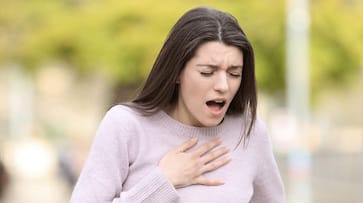Dehydration can lead to increased strain on your heart, lungs, and kidneys. If you experience sudden tiredness or dizziness during the summer months, it's crucial to take it as a warning sign. To avoid the risk of heart related problems in summer, include these health tips into your daily routine.
With the summer heat, the risk of heat-related illnesses, such as heat stroke, is on the rise. These conditions can lead to symptoms like vomiting, diarrhoea, and in severe cases, even increase the risk of heart attacks. Dehydration can impact various bodily functions. Therefore, it becomes extremely important to prioritize health and stay well-hydrated during the hot summer months.
Dehydration can lead to increased strain on your heart, lungs, and kidneys. People suffering from heart diseases become more vulnerable to the risk of heart attacks. A heat stroke can cause symptoms like fatigue and fainting. If you experience sudden tiredness or dizziness during the summer months, it's crucial to take it as a warning sign. Moreover, if you experience a sudden severe headache while out in the summer heat, it could be a sign of high blood pressure.
To protect yourself from the heat, follow these tips:
• Stay hydrated by drinking plenty of water or other healthy drinks such as milk, smoothies, or fruit juices.
• Refrain from drinking coffee and tea, as they can contribute to dehydration.
• Reduce alcohol intake, as it can also lead to dehydration.
• Increase the intake of cold foods like salads and fruits, which are high in water content and provide essential vitamins and minerals.
• Maintain a cool indoor environment by keeping your house well-ventilated and shaded from direct sunlight using shutters or curtains.
• Wear light, loose-fitting clothing for comfort.
• Avoid going outside, typically between 11 am and 3 pm, when the heat is on its peak.
• When going outdoors, take precautions such as applying sunscreen, wearing a hat, and carrying water bottle with you.
If you experience fatigue, follow these tips:
• Seek out a cool place to rest.
• Lie down and elevate your legs slightly to improve circulation.
• Stay hydrated by drinking plenty of water.
• Cool your skin by using a spray bottle or sponge with cold water.
• Apply cold packs or ice packs to your armpits or neck to lower your body temperature.
• If symptoms persist or worsen, seek medical attention promptly.
Last Updated Apr 13, 2024, 12:22 PM IST









![Salman Khan sets stage on fire for Anant Ambani, Radhika Merchant pre-wedding festivities [WATCH] ATG](https://static-gi.asianetnews.com/images/01hr1hh8y86gvb4kbqgnyhc0w0/whatsapp-image-2024-03-03-at-12-24-37-pm_100x60xt.jpg)
![Pregnant Deepika Padukone dances with Ranveer Singh at Anant Ambani, Radhika Merchant pre-wedding bash [WATCH] ATG](https://static-gi.asianetnews.com/images/01hr1ffyd3nzqzgm6ba0k87vr8/whatsapp-image-2024-03-03-at-11-45-35-am_100x60xt.jpg)


